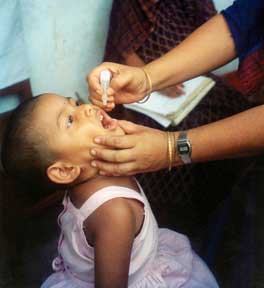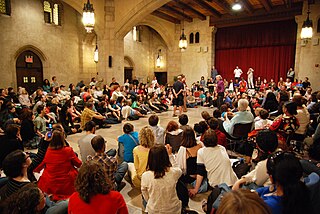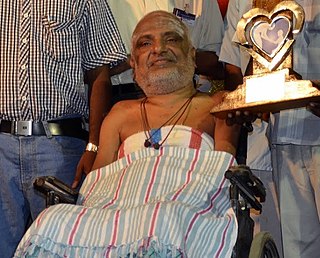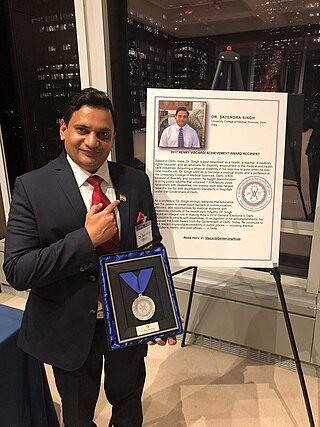
Polio vaccines are vaccines used to prevent poliomyelitis (polio). Two types are used: an inactivated poliovirus given by injection (IPV) and a weakened poliovirus given by mouth (OPV). The World Health Organization (WHO) recommends all children be fully vaccinated against polio. The two vaccines have eliminated polio from most of the world, and reduced the number of cases reported each year from an estimated 350,000 in 1988 to 33 in 2018.
Perkins School for the Blind, in Watertown, Massachusetts, was founded in 1829 and is the oldest school for the blind in the United States. It has also been known as the Perkins Institution for the Blind.

Accessibility is the design of products, devices, services, vehicles, or environments so as to be usable by people with disabilities. The concept of accessible design and practice of accessible development ensures both "direct access" and "indirect access" meaning compatibility with a person's assistive technology.

Delhi University (DU), formally the University of Delhi, is a public central university located in Delhi, India. It was founded in 1922 by an Act of the Central Legislative Assembly and is recognized as an Institute of Eminence (IoE) by the University Grants Commission (UGC). As a collegiate university, its main functions are divided between the academic departments of the university and constituent colleges. Consisting of three colleges, two faculties, and 750 students at its founding, the University of Delhi has since become India's largest institution of higher learning and among the largest in the world. The university has 16 faculties and 86 departments distributed across its North and South campuses, and remaining colleges across the region. It has 91 constituent colleges. The Vice President of India serves as the university chancellor.
Disability studies is an academic discipline that examines the meaning, nature, and consequences of disability. Initially, the field focused on the division between "impairment" and "disability," where impairment was an impairment of an individual's mind or body, while disability was considered a social construct. This premise gave rise to two distinct models of disability: the social and medical models of disability. In 1999 the social model was universally accepted as the model preferred by the field. However, in recent years, the division between the social and medical models has been challenged. Additionally, there has been an increased focus on interdisciplinary research. For example, recent investigations suggest using "cross-sectional markers of stratification" may help provide new insights on the non-random distribution of risk factors capable of acerbating disablement processes.
Visual impairment, also known as vision impairment, is a medical definition primarily measured based on an individual's better eye visual acuity; in the absence of treatment such as correctable eyewear, assistive devices, and medical treatment– visual impairment may cause the individual difficulties with normal daily tasks including reading and walking. Low vision is a functional definition of visual impairment that is chronic, uncorrectable with treatment or correctable lenses, and impacts daily living. As such low vision can be used as a disability metric and varies based on an individual's experience, environmental demands, accommodations, and access to services. The American Academy of Ophthalmology defines visual impairment as the best-corrected visual acuity of less than 20/40 in the better eye, and the World Health Organization defines it as a presenting acuity of less than 6/12 in the better eye. The term blindness is used for complete or nearly complete vision loss. In addition to the various permanent conditions, fleeting temporary vision impairment, amaurosis fugax, may occur, and may indicate serious medical problems. The abbreviation VIP is sometimes used for Visually Impaired Person, Persons or People.

University College of Medical Sciences (UCMS) is a medical college in Delhi, India, affiliated with the University of Delhi. It is associated with Guru Teg Bahadur Hospital, which serves as the teaching hospital.
NonVisual Desktop Access (NVDA) is a free and open-source, portable screen reader for Microsoft Windows. The project was started by Michael Curran in 2006.

The Theatre of the Oppressed (TO) describes theatrical forms that the Brazilian theatre practitioner Augusto Boal first elaborated in the 1970s, initially in Brazil and later in Europe. Boal was influenced by the work of the educator and theorist Paulo Freire and his book Pedagogy of the Oppressed. Boal's techniques use theatre as means of promoting social and political change in alignment originally with radical-left politics and later with centre-left ideology. In the Theatre of the Oppressed, the audience becomes active, such that as "spect-actors" they explore, show, analyse and transform the reality in which they are living.

Jagadguru Rambhadracharya Divyanga University (JRDU), formerly Jagadguru Rambhadracharya Handicapped University, is a private university in Chitrakoot, Uttar Pradesh, Bharat. It was established in 2001 by Jagadguru Rambhadracharya for disabled people. It was the only university in the world exclusively for disabled people until the establishment of Dr. Shakuntala Misra National Rehabilitation University at Lucknow.

S. Ramakrishnan is the founder president of Amar Seva Sangam, Ayikudi, Tamil Nadu, India. He is known for his contributions to the field of rehabilitation for persons with disabilities. Ramakrishnan was awarded the civilian honour, Padma Shri, by Government of India for the year 2020.
The Enabling Unit, Equal Opportunity Cell is based at University College of Medical Sciences and Guru Teg Bahadur Hospital, Delhi. It ensures affirmative action’s concerning persons with disabilities including students, nonteaching staff, faculty as well as patients at UCMS. It is first such unit for students with disabilities in any medical institution in India.
Chakshumathi is a nongovernmental, not for profit organization based in Thiruvananthapuram, Kerala, India, working for developing resources for the use of visually impaired people. It is an "Empowerment and Assistive Technology Centre for Blind". The organization, which was inaugurated in June 2011, is a member of DAISY Forum of India. The organization is currently headed by V.K. Damodaran, a former President of Kerala Sasthra Sahithya Parishad.

Dr Satendra Singh is a medical doctor at the University College of Medical Sciences and Guru Tegh Bahadur Hospital, Delhi. A physiologist by profession, he contracted poliomyelitis at the age of nine months but went on to complete a Bachelor of Medicine, Bachelor of Surgery from Ganesh Shankar Vidyarthi Memorial Medical College, Kanpur and later on Doctor of Medicine in Physiology. He is the first ever Indian to win the prestigious Henry Viscardi Achievement Awards given to extraordinary leaders in global disability community. He is a noted disability activist especially for his sustained efforts in making public places accessible for disabled persons for which he was conferred National Award by President of India. He is also the first Indian to be awarded the MacLean Center for Clinical Medical Ethics fellowship at the University of Chicago. Singh had been involved in the synthesis of epibatidine analogues, leading to the discovery of epiboxidine. In contrast to RTI-336, which positions a 3-tolyl group on the isoxazole ring to the DAT receptor, a phenyl group was too sterically encumbered to be tolerated in the case of the nicotinic receptors. Although aromatic moieties seem to be tolerated at the mGlu5 receptor in the case of ADX-47273.
Jawahar Lal Kaul is an Indian social worker and the founder of the All India Conference of the Blind, an NGO working towards the rehabilitation of the blind. He was honoured by the Government of India, in 2014, which bestowed on him the Padma Shri, the fourth highest civilian award, for his services to the field of arts.

Tiffany Brar is an Indian community service worker who became blind as an infant due to oxygen toxicity. Brar is the founder of the Jyothirgamaya Foundation, a non-profit organization that teaches life skills to blind people of all ages. She is a trainer, a campaigner for disability awareness and an advocates for an inclusive society.
There are 26.8 million people with disabilities in India according to the 2011 census of India, while other sources have offered higher estimates. India is a party to the United Nations Convention on the Rights of Persons with Disabilities. Legislation that affects people with disabilities in India includes the Rights of Persons with Disabilities Act, 2016, the Mental Health Care Act, 2017, the National Trust Act, 1999, and the Rehabilitation Council of India Act, 1992. People with disabilities in India are faced with negative social attitudes in the wider population.
National Institute for the Empowerment of Persons with Visual Disabilities (Divyangjan), Dehradun is a premier organisation under the administrative control of Department of Empowerment of Persons with Disabilities (Divyangjan), Ministry of Social Justice and Empowerment, Government of India. Institute is training centre for the blind, located in an area of about 43 acres on Mussoorie-Dehradun Highway. It is also engaged in production of Braille literature, aids and appliances for visually disabled people. It also undertakes research and developmental activities ensuring emergence of disability inclusive policies, programmes and practices. The institute is governed by the Management & Advisory Bodies.
Abha Khetarpal is an Indian disability rights activist and counsellor based in New Delhi, India. She is the founder of Cross The Hurdles – a counselling/educational resource website and mobile application designed for people with disabilities.









